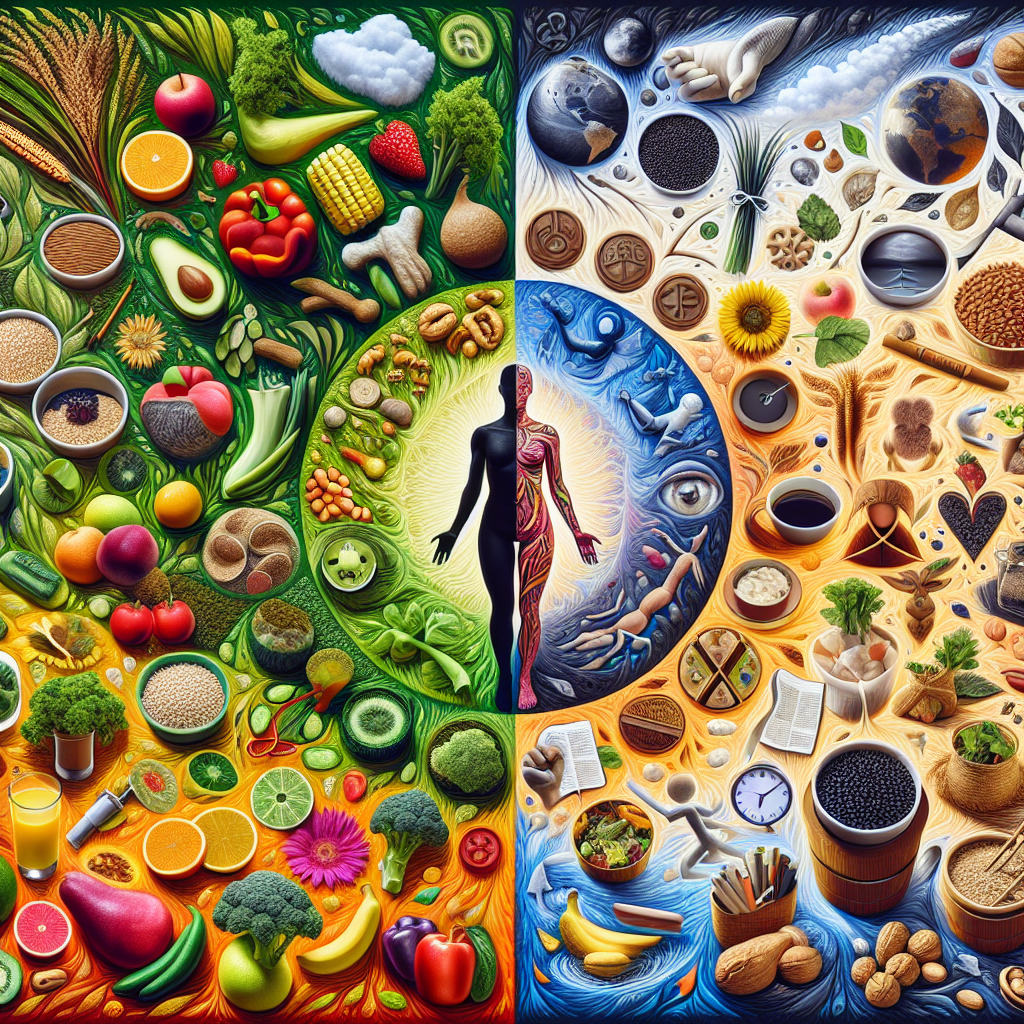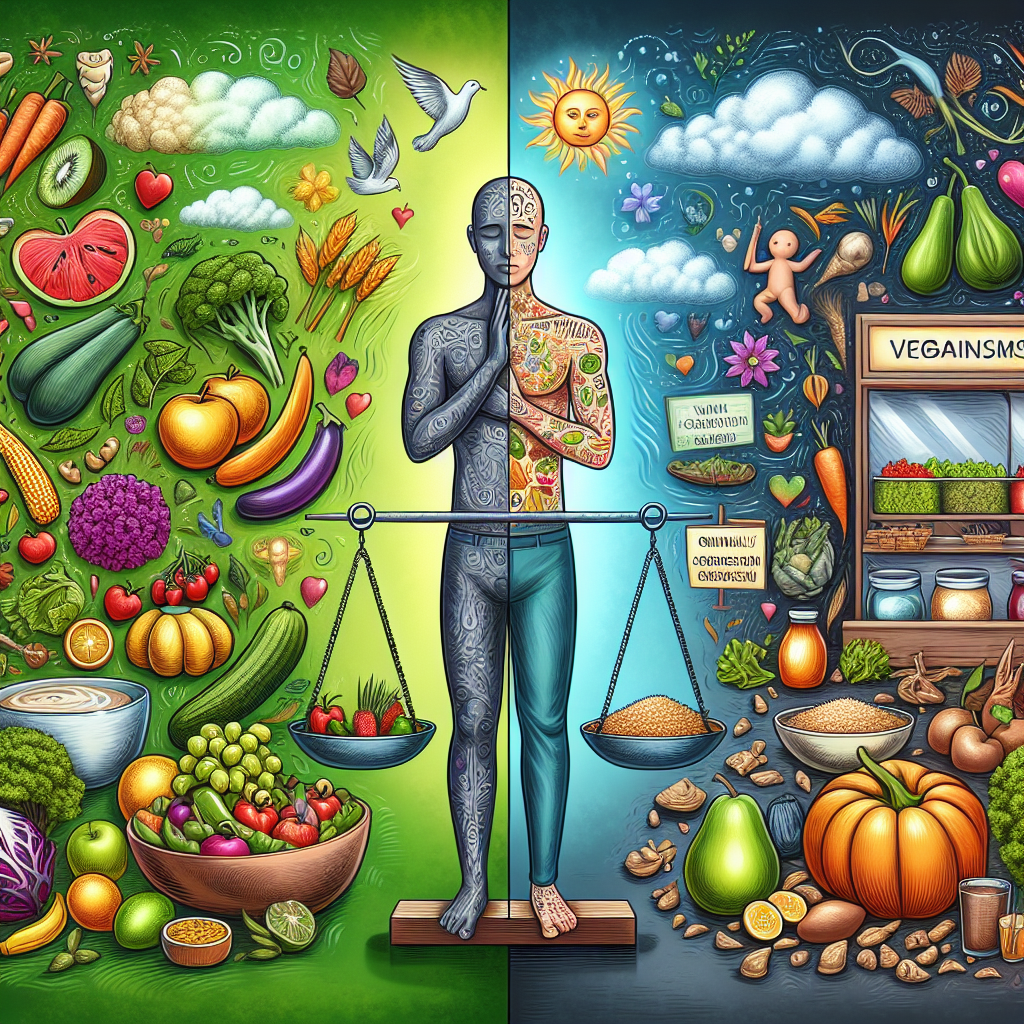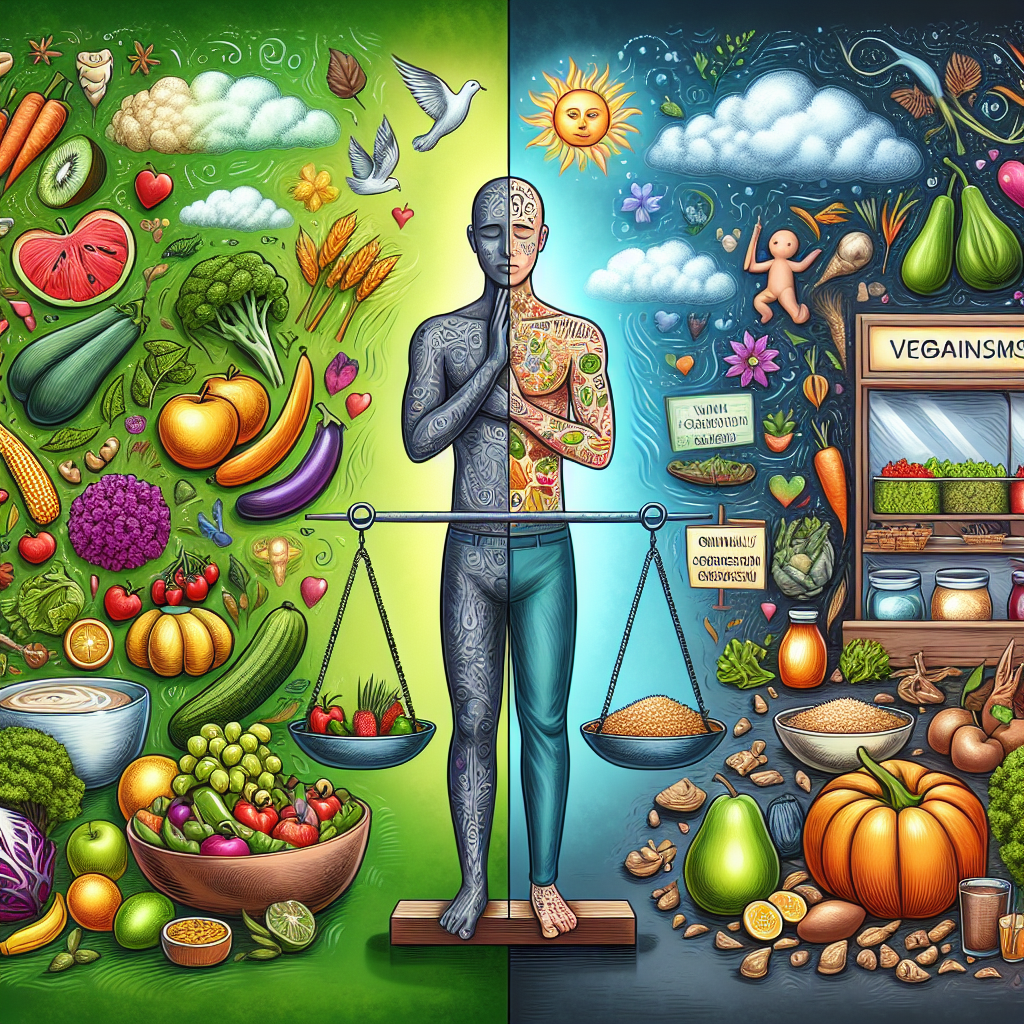Are you curious about the vegan lifestyle, but unsure if it’s the right fit for you? Look no further, as this article will provide you with a comprehensive overview of the pros and cons of adopting a vegan lifestyle. From the health benefits to the environmental impact, we will explore both sides of the coin to help you make an informed decision. So, whether you’re considering going vegan or simply interested in learning more, keep reading to discover the pros and cons of embracing this plant-based lifestyle.
Health Benefits
Nutrient-rich diet
A vegan diet is often rich in nutrients, as it emphasizes the consumption of fruits, vegetables, whole grains, legumes, nuts, and seeds. These plant-based foods are packed with vitamins, minerals, antioxidants, and other beneficial compounds that promote overall health and well-being. By following a vegan diet, you can ensure that you’re getting a wide range of essential nutrients to support your body’s optimal functioning.
Reduced risk of chronic diseases
Numerous studies have shown that a vegan lifestyle can help reduce the risk of chronic diseases. High consumption of fruits and vegetables, which are staples in a vegan diet, has been linked to a lower incidence of conditions such as heart disease, stroke, high blood pressure, and certain types of cancer. The abundance of fiber and antioxidants in plant-based foods contributes to these protective effects.
Weight management
Following a vegan diet can also be beneficial for weight management. Plant-based foods tend to be lower in calories and higher in fiber compared to their animal-based counterparts. This means that you can feel full and satisfied while consuming fewer calories, which can help with weight loss or weight maintenance. Additionally, a vegan diet typically includes healthier fats and avoids the saturated fats found in animal products, which can contribute to weight gain and obesity.
Lower cholesterol levels
A vegan diet has been shown to reduce cholesterol levels, especially the levels of LDL (bad) cholesterol. Animal products, such as meat and dairy, are often high in saturated and trans fats, which can raise cholesterol levels and increase the risk of heart disease. By eliminating these products and focusing on plant-based alternatives, you can significantly lower your cholesterol levels and improve your heart health.
Ethical Considerations
Reduces animal suffering
One of the core reasons people choose to follow a vegan lifestyle is to reduce animal suffering. The meat, dairy, and egg industries often involve practices that can be considered inhumane and cruel. By abstaining from consuming these products, you are actively choosing to support a more compassionate and ethical approach to food production. It allows you to align your personal values with your dietary choices and decrease the demand for animal exploitation.
Environmentally friendly
Another benefit of the vegan lifestyle is its positive impact on the environment. Animal agriculture is a significant contributor to greenhouse gas emissions, deforestation, and water pollution. By adopting a vegan diet, you can greatly reduce your carbon footprint and help combat climate change. Plant-based foods require fewer resources to produce, resulting in less environmental damage and a more sustainable way of living.
Supports cruelty-free practices
Choosing a vegan lifestyle also means supporting cruelty-free practices beyond just food consumption. By opting for vegan-friendly personal care products, clothing, and household items, you are contributing to the reduction of animal testing and the demand for products derived from animals. This holistic approach to veganism allows you to extend your compassionate choices beyond the dinner plate and make a positive impact on the world around you.

Nutritional Challenges
Potential nutrient deficiencies
While a well-planned vegan diet can provide all the necessary nutrients, there is a risk of potential deficiencies if proper care is not taken. Certain nutrients, such as vitamin B12, iron, calcium, and omega-3 fatty acids, are typically found in higher amounts in animal products. Vegans need to be mindful of obtaining these nutrients from plant-based sources or considering supplements to ensure optimal nutrition.
Sources of key nutrients
To address potential nutrient deficiencies, it’s important to know which plant-based sources are rich in key nutrients. Foods such as fortified plant milk, tofu, tempeh, leafy greens, legumes, nuts, seeds, and algae can provide essential nutrients like calcium, iron, protein, and omega-3 fatty acids. By incorporating a variety of these foods into your diet, you can meet your nutritional needs and maintain a balanced vegan lifestyle.
Proper meal planning
To ensure a well-rounded and nutritionally sound vegan diet, proper meal planning is crucial. It involves carefully selecting a variety of foods from different food groups to meet your nutritional requirements. Planning meals ahead of time can help prevent nutrient deficiencies and ensure that you’re consuming a balanced diet. Consulting with a registered dietitian or nutritionist can also be beneficial in creating a personalized meal plan that meets your specific needs.
Social and Practical Considerations
Limited food options in some settings
One of the challenges of following a vegan lifestyle is the limited food options available in certain settings. While veganism has gained popularity, there may still be situations where finding vegan-friendly meals or snacks can be a challenge, such as at family gatherings, work events, or while traveling. However, with awareness and preparation, it is possible to navigate these situations and maintain your vegan diet. Researching vegan-friendly restaurants, carrying snacks, and communicating your dietary needs in advance can help ensure that you have viable options in these settings.
Social challenges and stigma
Choosing a vegan lifestyle can sometimes be met with social challenges and stigma. Some individuals may not understand or support your dietary choices, leading to criticism or questioning. It’s important to stay confident in your decision and be prepared to educate others about the ethical, environmental, and health reasons behind your choices. Building a support network of like-minded individuals, whether it’s through local vegan groups or online communities, can also help alleviate any potential social challenges.
Dining out as a vegan
Eating out as a vegan can present its own set of challenges, but it’s becoming increasingly easier as more restaurants cater to plant-based diets. When dining out, it’s helpful to check menus in advance, inquire about vegan options, and communicate with restaurant staff to ensure that your dietary preferences are accommodated. Many establishments now offer vegan alternatives or are willing to modify dishes to suit your needs. By being proactive and assertive about your vegan choices, you can enjoy dining out while staying true to your values.

Environmental Impact
Reduced greenhouse gas emissions
One of the most significant environmental benefits of a vegan lifestyle is the reduction in greenhouse gas emissions. Animal agriculture is a major contributor to carbon dioxide, methane, and nitrous oxide emissions, which are leading causes of climate change. By eliminating or minimizing the consumption of animal products, you can significantly reduce your carbon footprint and help mitigate the effects of global warming.
Lower water and land usage
Animal agriculture requires vast amounts of water and land resources. Raising livestock necessitates significant water consumption for animal hydration, crop irrigation, and feed production. Additionally, vast areas of land are cleared for grazing and growing animal feed, leading to deforestation and habitat destruction. By choosing a vegan lifestyle, you can help conserve water and protect ecosystems by reducing the demand for these resources-intensive practices.
Protection of biodiversity
The expansion of animal agriculture often comes at the expense of biodiversity. Wildlife habitats are frequently cleared to make way for livestock farming or to grow feed crops. This leads to the displacement and extinction of numerous plant and animal species. By embracing a vegan lifestyle, you can contribute to the protection of biodiversity by reducing the demand for animal products and supporting more sustainable and environmentally friendly agricultural practices.
Potential Weight Loss
Plant-based diet and weight management
If weight loss is one of your goals, a plant-based diet can be a helpful tool. Plant-based foods tend to be lower in calorie density and higher in fiber compared to animal-based foods, which can aid in weight management. Fruits, vegetables, whole grains, legumes, and plant-based proteins are typically more filling and satisfying, helping to curb hunger and reduce calorie intake. By emphasizing these foods in your diet, you can create a natural calorie deficit that promotes weight loss.
High fiber content
Fiber plays a crucial role in weight management as it adds bulk to your meals, making you feel fuller for longer. Plant-based foods are rich in dietary fiber, including soluble and insoluble fiber, which helps regulate your appetite, stabilize blood sugar levels, and improve digestive health. The high fiber content of a vegan diet can contribute to weight loss by promoting a feeling of satiety, reducing overeating, and supporting overall gastrointestinal well-being.
Lower calorie intake
Another reason a vegan diet may aid in weight loss is its inherently lower calorie intake. Plant-based foods are generally less calorie-dense compared to high-fat animal products. By shifting your diet towards whole, plant-based foods, you naturally consume fewer calories without feeling deprived. This can make it easier to achieve and maintain a calorie deficit, leading to gradual and sustainable weight loss.
Reduced Risk of Chronic Diseases
Lower risk of heart disease
Heart disease is a leading cause of death worldwide, but a vegan lifestyle can significantly reduce the risk. The emphasis on plant-based foods in a vegan diet helps lower cholesterol levels, blood pressure, and inflammation, which are all established risk factors for heart disease. The abundance of heart-healthy nutrients, such as antioxidants, fiber, and unsaturated fats found in plant-based foods, contributes to cardiovascular protection and promotes overall heart health.
Decreased chances of type 2 diabetes
Type 2 diabetes is a metabolic disorder characterized by insulin resistance and elevated blood sugar levels. Research suggests that a vegan diet can help prevent and manage type 2 diabetes by improving insulin sensitivity, promoting weight loss, and reducing the risk of obesity. The low glycemic load of plant-based foods and their rich content of fiber, antioxidants, and complex carbohydrates contribute to better blood sugar control and reduced chances of developing this chronic condition.
Potential cancer prevention
Certain cancers, such as colon, breast, and prostate cancer, have been linked to dietary factors. A vegan diet rich in fruits, vegetables, whole grains, legumes, and nuts offers significant protection against many types of cancer. These plant-based foods are abundant in antioxidants and phytochemicals that have been shown to inhibit tumor growth, reduce inflammation, and neutralize free radicals that can damage cells. A well-rounded vegan diet with a variety of plant-based sources can potentially lower the risk of cancer development.
Long-term Sustainability
Long-term health benefits
Adopting a vegan lifestyle can lead to a multitude of long-term health benefits. By consuming a nutrient-rich diet, you provide your body with the necessary vitamins, minerals, and antioxidants to support optimal functioning. This can contribute to a reduced risk of chronic diseases, improved cardiovascular health, better weight management, and enhanced overall well-being. Choosing a vegan lifestyle is a long-term commitment to your health and longevity.
Environmentally sustainable approach
Considering the environmental impact of our choices is crucial for long-term sustainability. By adopting a vegan lifestyle, you actively contribute to minimizing resource consumption, reducing greenhouse gas emissions, protecting ecosystems, and preserving biodiversity. The lower carbon footprint and reduced strain on water and land resources make veganism an environmentally sustainable choice that can help ensure a healthier planet for future generations.
Animal welfare advocacy
The ethical aspect of veganism extends beyond the realms of personal health and environmental conservation. By adopting a vegan lifestyle, you become an advocate for animal welfare and contribute to the movement against animal cruelty. Your dietary choices align with values of compassion, empathy, and respect for all living beings. Through this advocacy, you can inspire others to consider the impact of their own choices on animals and promote positive change in society.
Increased Energy Levels
Plant-based sources of energy
A vegan diet can provide ample energy to fuel your daily activities. Whole, plant-based foods are rich in complex carbohydrates, which serve as the primary source of energy for your body. Foods like fruits, vegetables, whole grains, legumes, and nuts supply a steady release of energy due to their high fiber content and low glycemic index. By fueling your body with these nutrient-dense, plant-based sources, you can experience sustained energy levels throughout the day.
Improved digestion and nutrient absorption
The fiber content of a vegan diet promotes healthy digestion and nutrient absorption. Adequate consumption of fruits, vegetables, whole grains, and legumes ensures regular bowel movements and prevents digestive issues such as constipation. A healthy gut environment is crucial for optimal nutrient absorption, as it allows for efficient breakdown and assimilation of essential vitamins and minerals. By prioritizing plant-based foods, you can support a healthy digestive system and enhance your body’s ability to extract energy from the foods you consume.
Balanced blood sugar levels
A vegan lifestyle can support balanced blood sugar levels, which is essential for sustained energy levels throughout the day. Plant-based foods, being low in refined sugars and high in complex carbohydrates, have a smaller impact on blood sugar compared to processed and sugary foods. The fiber content in fruits, vegetables, whole grains, and legumes slows down the absorption of sugar into the bloodstream, preventing sudden spikes and crashes in energy levels. By maintaining stable blood sugar levels through a vegan diet, you can enjoy sustained energy and avoid the energy crashes often associated with high-sugar diets.
Potential Nutrient Deficiencies
Vitamin B12
Vitamin B12 is a nutrient primarily found in animal-based foods and is essential for proper nerve function, DNA synthesis, and red blood cell production. Vegans are at an increased risk of vitamin B12 deficiency as plant-based sources are scarce. It’s important to consider supplementation or consume fortified foods, such as plant milk or breakfast cereals, to ensure adequate intake of vitamin B12.
Iron
Iron is necessary for the formation of red blood cells and oxygen transport within the body. While plant-based sources of iron are available, the absorption of non-heme iron from plant foods is typically lower than heme iron from animal sources. Combining plant-based iron sources with vitamin C-rich foods can enhance iron absorption. Additionally, including legumes, tofu, tempeh, nuts, seeds, and dark leafy greens in your diet can help meet your iron needs.
Calcium
Calcium is essential for strong bones and teeth, nerve function, and muscle contraction. While dairy products are a common source of calcium in many diets, vegans can obtain this mineral from plant-based sources such as fortified plant milk, tofu, tempeh, leafy greens, almonds, and sesame seeds. Ensuring adequate calcium intake through these sources or considering calcium-fortified products can help prevent deficiencies.
Omega-3 fatty acids
Omega-3 fatty acids are crucial for brain health, heart health, and inflammation regulation. While fish is a well-known source of omega-3 fatty acids, vegans can obtain these nutrients from plant-based sources such as flaxseeds, chia seeds, hemp seeds, walnuts, and algae-based supplements. Including these sources in your diet or considering supplementation can help meet your omega-3 fatty acid requirements as a vegan.

